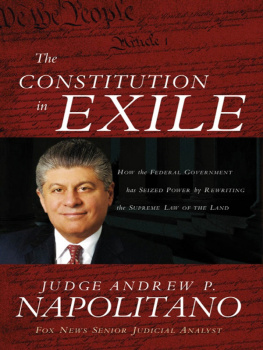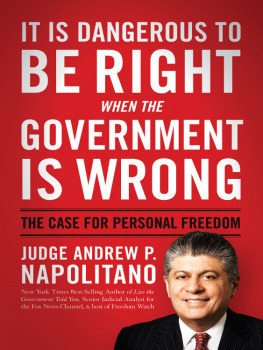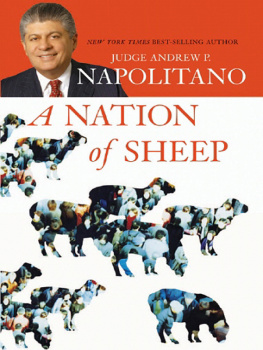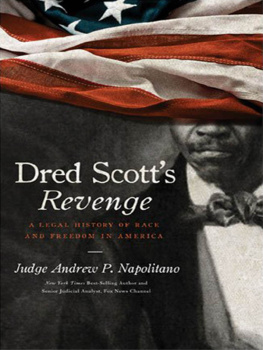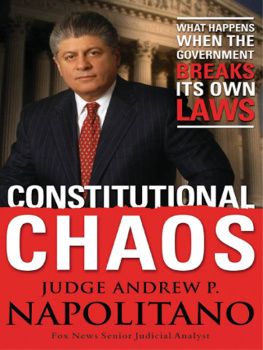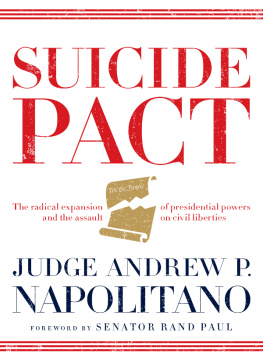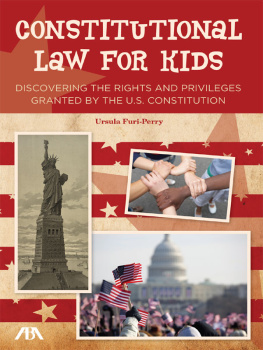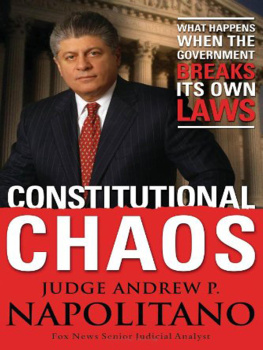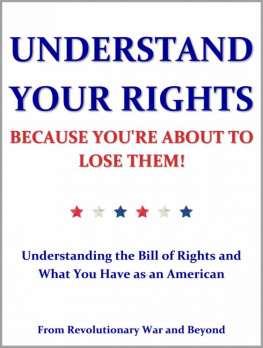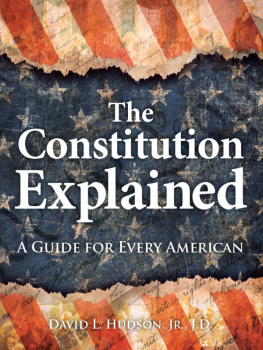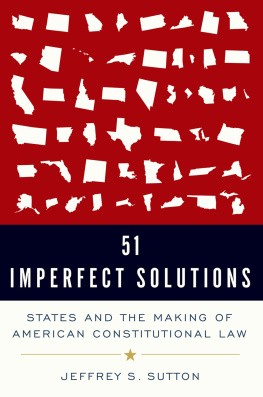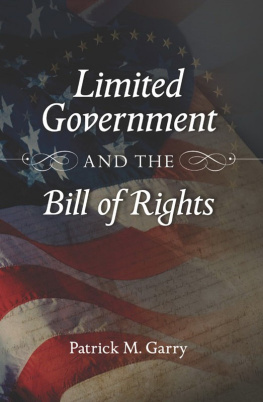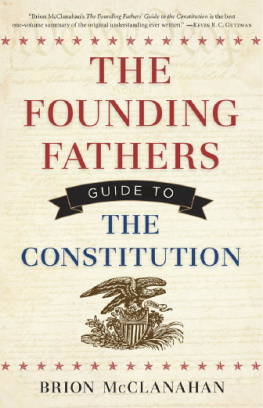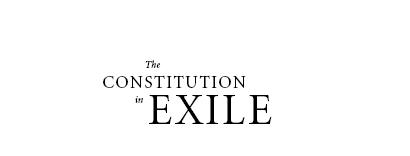
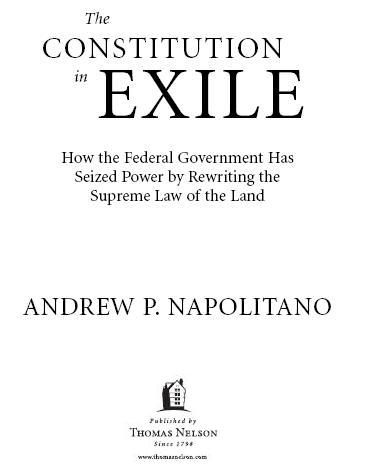
We'd love to hear from you about your experience with this book. Please go to www.thomsnelson.com/letusknow for a quick and easy way to give us your feedback.
Love to read? Get excerpts from new books sent to you by email. Join Shelf Life, Thomas Nelson's FREE online book culb. Go to www.thomasnelson.com/shelflife.
Copyright 2006 by Andrew P. Napolitano
All rights reserved. No portion of this book may be reproduced, stored in a retrieval system, or transmitted in any form or by any meanselectronic, mechanical, photocopy, recording, scanning, or otherexcept for brief quotations in critical reviews or articles, without the prior written permission of the publisher.
Published in Nashville, Tennessee, by Thomas Nelson, Inc.
Thomas Nelson, Inc. books may be purchased in bulk for educational, business, fundraising, or sales promotional use. For information, please e-mail SpecialMarkets@ThomasNelson.com.
Library of Congress Cataloging-in-Publication is on file with the Library of Congress.
ISBN 1-59555-030-5 (hardcover)
ISBN 10: 1-59555-070-4 (trade paper)
ISBN 13: 978-1-59555-070-5 (trade paper)
Printed in the United States of America
07 08 09 10 11 RRD 6 5 4 3 2 1
This book is dedicated to
PRESIDENT THOMAS JEFFERSON,
who authored
The Declaration of Independence,
and who,
alone among the presidents,
allowed tyrannical laws to expire,
and who reminded posterity that
When the people fear the government, there is tyranny.
When the government fears the people, there is liberty.
ALSO BY ANDREW P. NAPOLITANO:
Constitutional Chaos:
What Happens When the Government
Breaks Its Own Laws
(Thomas Nelson, Inc. 2004)
CONTENTS
We are a nation that has a government, not the other way around.
* * *
The federal government did not create the states; the states created the federal government.
* * *
Government is not the solution to our problems. Government is the problem.
PRESIDENT RONALD REAGAN
Do we still have a Constitution?
Before you jump to answer too quickly, hear me out. Today the federal government recognizes no limitations on its power. It has utterly rejected the idea, integral to the Constitution, that it is one of limited powers, carefully and precisely delegated. Today the federal government does whatever it wants to do. In essence, the feds say: Dont like the drinking age in South Dakota? Well, just threaten their highway funds and theyll come around. Is the FBI frustrated by public scrutiny? Just make it a felony to speak about receiving certain self-written search warrants. Dont like the idea of kids working after school? Just make shipment of the furniture they make illegal. Think any of this might be unconstitutional? Well, well just let the courts sort it out.
It may sound harsh, but I have heard similar thoughts expressed time and again. They reveal an utter contempt for the Constitution, a mind-set that believes that when it comes to government, bigger is better, and a nanny state attitude that says the bureaucrats and fat cats in Washington D.C. know better what enhances our freedom than we do.
And Congress is not the only culprit. Two of our most historically revered presidents committed crimes that today are unthinkable. Abraham Lincoln and Franklin Delano Roosevelt simply ignored the Constitutions basic restraints on the government. Lincoln arrested thousands of folks because they disagreed with him, and FDR arrested over one hundred thousand Americans because of their race andethnicity
How did we get here? How did thirteen idealistic colonies, founded under the rubric of freedom and individualism, not security and Big Government, allow an out-of-control, monster federal government to regulate the most intimate aspects of our lives?
The purpose of this book is to tell the unhappy story of liberty lost, federalism trampled, and Big Government run amok. The United States Constitution established the framework for a federal government holding only specific, enumerated powers. Yet the federal government has actually involved itself or threatened to do so in a vast array of human behavior, nowhere even hinted at in the Constitution. Today the federal government intrudes itself into the blood alcohol level of automobile drivers, the legal drinking age for alcohol, the amount of wheat a farmer can grown for his own use, the ability of a terminally ill cancer patient to grow medical marijuana for personal use, the amount of sugar manufacturers can use in ketchup, rebuilding private homes after hurricanes, regulating steroids in athletes blood, regulating the size of toilets in private homes, preventing states from enhancing the freedom of their citizens to join publicly funded groups, using the concept of federalism when it suits the Congress but rejecting it when Congress disagrees, saving banks from the thieves who robbed them, regulating state court systems, and forcing states to increase penalties for state crimes.
The Founders gave us a small, discrete federal government, one of strictly limited powers; powers to address issues that are federal in nature. The Congress has confused federal with national, and has chosen to regulate any issue that it thinks affects more than one state, irrespective of the absence of federal power and the true presence of state power.
This book addresses how and why our central government went so far astray and what we should do to correct it. Almost as if by design, every generation in the federal government, from George Washington to George W. Bush, has only sought more power for itself. They have ignored the constitutional limits on their powers and, in essence, sent the Constitution into exile.
How did they do it? How have they gotten away with it? What will become of our freedoms if the Constitution is exiled?
What Rosa Parks Knew That We Forget
To understand the Constitution and where it came from, we must look at its counterpart, the Declaration of Independence, and we must understand the Natural Law that grounds both documents.
Whether they realize it or not, most contemporary legal scholars and politicians in the Western world stand behind two competing theories about the origins of law and liberty: Natural Law and Positivism. The Natural Law school of thought argues that freedom comes by virtue of being created human, from our very nature, and holds that laws created by kings or legislatures are always secondary to the Natural Law. It is the royal flush against which any other law is merely a pair of deuces.
This is not a new concept. The Greek writer Sophocles recognizes the reality that human laws are subject to a higher law, according to my professor of constitutional law and jurisprudence at Notre Dame Law School, Charles E. Rice. Similarly, Aristotle observed that one part of what is politically just is natural, and the other part is legal. Cicero described it as the highest reason, implanted in Nature, which commands what ought to be done and forbids the opposite. Writes Cicero, Right is based, not upon mens opinion [from popular legislatures], but upon Nature.
In more recent times, Justice Clarence Thomas, writing about the higher law political philosophy of the Founding Fathers, stated, Natural rights and higher law arguments are the best defense of liberty and of limited government. Moreover, without recourse to higher law, we abandon our best defense of judicial reviewa judiciary active in defending the Constitution. Rather than being a justification for the worst type of judicial activism, higher law is [the] only alternative to the willfulness of both run-amok majorities [in Congress] and run-amok judges [in federal courts].
Next page
